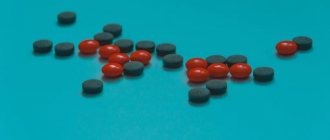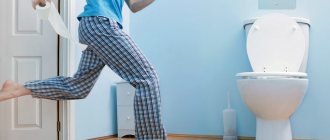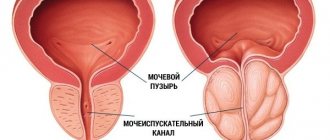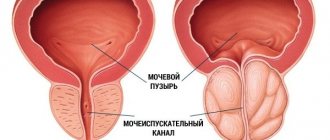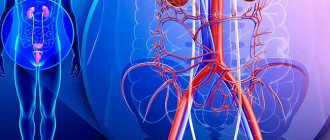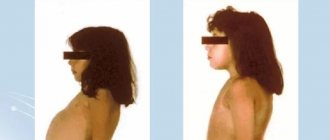Inflammation of the prostate today is a leader in the group of male diseases that are predominantly sexually transmitted. Its complications threaten infertility, decreased libido, and impotence.
Symptoms of prostatitis are not just pain, urination disorders, and inflammation of the spermatic cord. The most dangerous consequence of advanced inflammation can be cancerous degeneration of the prostate gland. Whereas a timely diagnosed pathological process is easily stopped.
Causes of inflammation
The risk of developing prostate inflammation increases due to various factors predisposing to the disease:
- Hypothermia, one-time or associated with the nature of work in the open air.
- A sedentary lifestyle leads to disruption of the functioning of the digestive system.
- Chronic somatic diseases (diabetes mellitus, hypertension).
- Foci of focal, perifocal infection (rhinitis, tonsillitis, stomatitis, gastritis).
- Persistent UGI (chlamydia, trichomoniasis, herpes virus).
- Stress, insomnia, chronic fatigue syndrome.
- Decreased immunity due to illness, surgery, emotional stress.
- Bad habits leading to the development of intoxication: alcohol, smoking, strong coffee.
- Occupational injuries to the perineum of car drivers, athletes, workers in hazardous industries.
- Promiscuous sex life, interrupted sexual intercourse, devoid of sensuality intercourse with incomplete ejaculation, prolonged absence of intimacy (low need for sperm leads to stagnation in the gland).
- Venereal diseases.
Despite a fairly large number of provocative moments, the essence of prostatitis is the occurrence of stagnation inside the organ against the background of impaired blood circulation and lymph outflow.
Why does the disease sometimes worsen, sometimes subsides?
Exacerbations are usually caused by a cold, as well as hypothermia of the legs and arms. In the summer, when it is warm, prostatitis is less of a concern for men; the disease worsens in spring and autumn, especially after a “healthy” swim in ice water.
Exacerbation of prostatitis after a cold
Most patients feel their condition worsen after spicy foods, smoked and fried foods, beer, sour wine, and champagne. In such cases, you need to follow a strict diet.
In cases where the stagnant component is more pronounced, sexual intercourse significantly alleviates the condition.
Classification
In modern urology there is no uniform classification of the disease. However, practicing doctors prefer this option for classifying the inflammatory process in the prostate:
- According to the course of the disease:
- Acute prostatitis. It accounts for more than 50% of cases of the disease in people no older than 30-35 years.
- Chronic option. It is considered a non-age category. It does not manifest itself for a long time; the impetus for its development is a cold or infection.
- For the reason that caused the pathology:
- Bacterial inflammation of the prostate gland, predominates in men under 40 years of age, occurs against the background of ultrasonography, and does not extend beyond the boundaries of the organ.
- Non-bacterial pathological changes in the gland, predominantly chronic.
- Viral inflammation of the prostate is characterized by an acute course that affects the entire genital area.
- Fibrous prostatitis is characterized by rapid irreversible growth of the gland and requires radical intervention. Clinically resembles prostate adenoma.
- Calculous inflammation of the prostate gland occurs due to the formation of stones inside the prostate. Considered as a harbinger of cancer.
- Congestive prostatitis, the result of a sedentary lifestyle, is diagnosed in every second patient.
The prostate has a defense mechanism
The prostate gland is physiologically protected from infection. Defense mechanisms include mechanical factors, antibacterial substances, cellular and humoral factors.
- Mechanical ones include: the length of the urethra, urination, ejaculate and the characteristic location of the canals.
- Antimicrobial substances are: prostate antimicrobial factor containing zinc and spermine, spermidine and lysozyme. The prostate contains the highest concentration of zinc in the body, which decreases with inflammation, leading to a local decrease in immunity.
- The cellular protection factor for prostate infection is the characteristic presence of leukocytes in urine, prostate secretions and semen. Increased phagocytosis in patients with infectious forms of prostatitis indicates a very important role of the cellular response in infections of the lower genitourinary system.
- In patients with prostate infections, titers of immunoglobulins in prostate secretions are elevated, most often IgA, IgG and IgM, and their levels are much higher than in blood serum.
Signs of the disease
If a man discovers at least two of the following symptoms of prostatitis, he should immediately contact a qualified specialist:
- Disorder of urination with the occurrence of an intermittent, weak stream of urine, unusually short, causing splashing, difficulty and pain before urination. Frequent urge to empty the bladder occurs mainly at night.
- Soreness, which is localized in the lower abdomen, radiates to the scrotum, perineum, and rectum.
- Sexual dysfunction.
- Problems with ejaculation, changes in sperm (consistency, quantity).
Acute prostatitis
The disease begins with a sharp rise in temperature (up to 40 degrees), painful headache, and fever. The symptoms that appear are accompanied by pain in the groin, perineum, back, discharge from the urethra, frequent urination and a constant urge to urinate.
Emptying the bladder occurs with a delay and a burning sensation. The urine itself becomes cloudy and may contain blood. Irritability and fatigue occur.
The outcome of acute prostatitis can be complete resolution of the process (if treatment is started in a timely manner). Since changes occur in many pelvic organs, they cannot be left to chance, otherwise the corresponding complications will arise:
- Vesiculitis is an inflammation of the seminal vesicles, the cause of the appearance of pus in the sperm, which not only reduces the quality of the ejaculate, but leads to loss of reproductive function.
- Colliculitis - inflammatory changes in the seminal tubercle become the reason for the development of severe pain during sex, interruption of orgasm, and impotence of a psychological nature.
- The formation of an abscess in the body of the prostate, its rupture, and purulent damage to the rectum leads to an exacerbation of symptoms, severe intoxication of the body, even death.
- Stagnation in the tissues of the prostate leads to changes in their structure, disruption of innervation, blood supply, both to the gland itself and to organs located nearby, with disruption of their functions. The erection becomes insufficient for full sexual intercourse, premature ejaculation and prolonged sexual intercourse without orgasm are observed.
- Cicatricial changes in the gland and spermatic cord lead to infertility, a decrease in the quality of sperm, and sperm motility. Narrowing of the urethra interferes with the normal process of urination; obstruction of the bladder can cause acute urinary retention, requiring emergency surgical care.
Structure and functions of the prostate gland
The prostate gland (prostate) is a hormone-dependent organ of the male body, located between the rectum and the muscular diaphragm of the bladder, between the seminal vesicles and the pubic symphysis.
The prostate resembles in shape an almost ripe chestnut fruit: the two lobes touch at the isthmus, and the vas deferens extend from it. On the prostate gland, a thin and not deep vertical groove runs almost in the center.
The prostate performs several important functions for reproduction:
- Produces a secretion that makes up 30% of the volume of sperm and ensures its liquid state;
- Blocks the ureter during sexual intercourse;
- Protects against penetration of pathogenic microorganisms into the urinary tract and kidneys.
Due to pathology in the tissues of the prostate gland, erectile function primarily suffers. In addition, the prostate is surrounded and penetrated by numerous branches of nerve fibers.
Due to inflammation (prostatitis), edema appears, swelling of the organ tissues, which compress the nerve bundles. The man is in severe pain.
Chronic prostatitis
The main feature of the disease is the vagueness of clinical symptoms with a long, persistent course of the process. More often, the chronic form occurs independently, as a primary pathology against the background of stagnation of blood in the vessels (prostatosis), abacterial prostatitis.
The main symptoms of chronic prostatitis are:
- fever;
- pain occurs in the scrotum, perineum, anus, back;
- urinary disturbance;
- mucous or mucopurulent discharge from the rectum, urethra, even in the absence of urination or defecation;
- erectile dysfunction, painful ejaculation, interrupted sexual intercourse, prolonged intercourse without a feeling of satisfaction.
Inaction and improper treatment of chronic prostatitis can cause complications:
- Infertility is the result of chronic inflammation in the spermatic cord, vesicles, testicles, and their appendages.
- Cystitis, pyelonephritis (other diseases of the genitourinary system) are a consequence of hematogenous and mechanical spread of microbes.
- Sepsis.
- Persistent decrease in immunity.
- Untreated prostatitis can cause cancer in 35–40% of cases.
Bibliography
- On the pathogenesis and prevention of chronic prostatitis (clinical and experimental study) / S.H. Al-Shukri, A.G. Gorbachev, S.Yu. Borovets, A.G. Tyurin, I.V. Knyazkin // Urological Gazette, 2012. - “2, vol. 2. - P. 15-18.
- Diagnosis of chronic abacterial prostatitis / Z.A. Kadyrov, V.S. Stepanov, Sh.V.Ramishvili, Sh.G Mashaneishvili // Andrology and genital surgery, 2021.- No. 3(20) – P.36-42 DOI: 10.17650/2070-9781-2019-20-3-00-00 .
- Clinical, laboratory and instrumental research methods in patients with chronic prostatitis and chronic hemorrhoids / Z.A. Kadyrov, Kryachko A.A. Z.O. Aliyev et al., // Andrology and genital surgery, 2021.- No. 17(17).-P. 34-38.
- Prostatitis: what is new and useful in fundamental and clinical research? / K.L. Lokshin // Bulletin of Urology, 2021.- No. 5(4).- P.69-78.
- Acute and chronic prostatitis - what is important for practice?/ K.G. Naber et al.// Bulletin of Urology, 2021.- No. 2.- P. 71-80.
- Chronic prostatitis: current issues of diagnosis and treatment at the stage of primary specialized and health care / D.I. Trukhan, D.G. Makushin, N.V. Bagisheva // International Journal of Applied and Basic Research. – 2021. – No. 6 (part 2) – P. 285-291.
Author:
Baktyshev Alexey Ilyich, General Practitioner (family doctor), Ultrasound Doctor, Chief Physician
Diagnostics
The clinical picture of the disease is typical, so the diagnosis is not difficult. It is performed by a urologist based on medical history, examination of the patient, laboratory minimum using the most modern medical devices:
- Rectal examination of the gland, taking secretions for examination (culture with determination of sensitivity to antibiotics).
- UAC, UAM, bacterial culture of urine.
- Smear test for STDs, UGI examination.
- Daily monitoring of urination rhythm, measurement of urination rate (uroflowmetry).
- For differential diagnosis, ultrasound or TRUS is performed.
- If it is necessary to exclude oncology, a biopsy is taken, urography is performed, and PSA is determined - prostate specific antigen.
- To diagnose infertility, a spermogram is prescribed - an analysis of ejaculate to determine the fertility of a man.
Based on the results of the patient’s examination, an individual scheme for complex treatment of prostatitis is drawn up. When prescribing drugs, the form of the pathology and the presence of concomitant diseases are taken into account. The decision about where to conduct therapy (inpatient or outpatient) is made by the doctor. The course of treatment is carried out with careful laboratory monitoring of results.
One of the most modern centers for the treatment of prostatitis are the clinics of the Mother and Child Group of Companies. Since the problem of infertility is closely related to inflammatory urological diseases, medical professionals pay great attention to this problem.
In the Mother and Child clinics, each patient has the opportunity to undergo a full cycle of special examination, receive psychological support, be treated with the latest generation drugs used in this area, and become familiar with the latest methods for treating prostate inflammation. Not least important in the complex therapy of prostatitis is the issue of effective rehabilitation of patients, clinical observation, and prevention.
Treatment of acute prostatitis
Acute prostatitis requires bed rest, a special, salt-free diet, and sexual rest.
Methods of course treatment:
- The most effective treatment for prostatitis is etiotropic therapy. If the basis of prostatitis is an infection, a course of antimicrobial agents is a priority, which relieves the manifestations of inflammation.
- Pain syndrome is relieved with analgesics, antispasmodics, rectal suppositories, microenemas with warm solutions of painkillers. NSAIDs may be used.
- Immunostimulants, immunomodulators, enzymes, vitamin complexes, and a combination of microelements have proven their effectiveness.
- Physiotherapeutic methods are possible only in the subacute stage of the disease. They improve microcirculation and increase immunity: UHF, microwave, electrophoresis, laser, magnetic therapy.
- Massage is another effective method of influencing the prostate. It opens the ducts, normalizes blood circulation in the scrotum and pelvis.
- Acute renal filtrate retention can be corrected by catheterization and trocar cystostomy.
- The purulent process involves surgical intervention.
- Psychologist consultations.
Treatment of chronic prostatitis
With a long-term, course (at least a month) effect on the prostate, there is no 100% guarantee of cure. Priority goes to herbal medicines, immunocorrection, changing household habits:
- Herbal preparations (for example, Licoprofit) are widely used in urological practice. They are able to accumulate at the site of the most active pathological process, protect cells from oxidation, remove free radicals, and prevent the proliferation of glandular tissue.
- Antibacterial therapy is selected individually, based on the sensitivity of microbes to drugs.
- Drugs that enhance immunity not only help to cope with prostatitis, they also correct the negative effects of antibiotics that disrupt the function of the immune system.
- The pain syndrome is relieved by the administration of alpha-blockers and muscle relaxants.
- Prostate massage allows you to mechanically remove the “extra” secretion of the gland through the urethra, improve blood circulation, and minimize congestion.
- Physiotherapy: laser, magnet, ultrasound, iontophoresis, warm sitz baths or microenemas with herbs.
- In severe cases, intravenous fluids with diuretics are indicated. This stimulates abundant urine production, prevents symptoms of intoxication, the development of ascending cystitis, and pyelonephritis.
- For constipation, herbal laxatives are used.
- The urologist and psychologist, together with the patient, develop an individual long-term program of daily routine, necessary rest, diet, dosed physical activity, and sexual activity.
- If the chronic process is resistant to therapy and the outflow of urine is blocked, surgical intervention is prescribed: removal of all affected tissue (transurethral resection of the prostate) or complete removal of the gland with surrounding tissues (prostatectomy). Practiced in exceptional cases, it is fraught with impotence and urinary incontinence. Young people do not undergo surgery because it can cause infertility.
Prevention
To prevent the occurrence of a disease that is unpleasant for men, you need to eliminate provoking factors and follow simple rules:
- Lead a healthy lifestyle, give up bad habits.
- Don't get too cold.
- Drink at least 1.5-2 liters of water per day.
- Strengthen your immune system, walk a lot, toughen up.
- Engage in physical education and sports, visit fitness clubs.
- Avoid stressful situations.
- Practice regular sex life with a regular partner.
- See a urologist regularly.
You can make an appointment at the Mother and Child clinic by calling the call center +7 800 700 700 or using the feedback form on the website.
What men need to know
- The prostate is seriously damaged by physical inactivity and prolonged uncomfortable forced posture. Those who spend their working day sitting should do at least gymnastics for the pelvic floor muscles.
- It is necessary to adhere to a healthy diet high in vitamins, protein, and eat more vegetables and fruits. But it is not recommended to adhere to the now fashionable vegetarian diet.
- Consume antioxidants - alpha and beta carotenes, vitamins E and C. They neutralize free radicals in the body caused by environmental pollution.
- Avoid spicy, fried, pickled foods, especially those seasoned with hot sauces, mustard, pepper, and horseradish.
- Under no circumstances should you drink alcohol. Smokers who care about the prostate, potency and fertility should give up this bad habit.
- Sexual life should be normal, in accordance with a man’s constitution and sexual temperament. It is forbidden to abstain from sexual intercourse. Avoid platonic sexual relations, which will cause the prostate and pelvic organs to become engorged with blood.
Quitting alcohol and smoking
